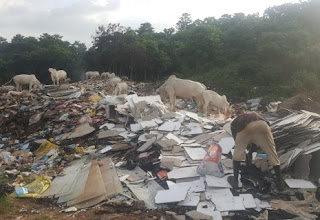INSIDE THE WORLD OF NIGERIA’S INFORMAL WASTE WORKERS
 |
| Sabi'u, a Nigerian waste picker |
The informal waste workers are people who make a living from waste but are not formally tasked with providing the service by the authorities. Common names for the category of waste workers in this article are baban-bola, onye mkpo ahihia, kole kole, asa-idoti, scavengers, and waste pickers.
The data I will be referring to in this article is from a survey of six dumpsites (illegal and government-approved) in Abuja, Nigeria.
The average age for a male informal waste worker who makes a living out of Abuja’s dumpsites and bins is 23 years, they are mostly migrants from other states in the Northern part of Nigeria such as Nassarawa, Kano, Katsina, Zamfara, and 72% migrated to Abuja in search of greener pastures within the last five years. Some of the occupations they were engaged in prior to relocation are farming, vehicle repair, equipment operation, and so on; some of them also mentioned that they were jobless before relocation.
They all have big dreams of going back to school for further studies, owning their own farms, eventually becoming middlemen here in Abuja, getting married and starting their own families, building houses, or relocating back to their states of origin to establish other businesses.
A typical day for the informal waste worker begins at 8:00am and ends at 6:00pm. They make between ₦600 and ₦2000 daily collecting, sorting, storing and reselling recyclables of various kinds usually plastics, paper and cardboard, bottles and glass, metals, etc. Their income is not very stable and is affected by factors such as seasonality, and decisions of buyers/middlemen, formal recycling enterprises and processors.
They collect either single or mixed streams of recyclables which they eventually sort and sell separately. Every work day, a waste worker recovers between 1000g - >3000g of recyclables from our dumpsites and bins.
66% of the informal waste workers covered in my study work on the dumpsites and 34% work outside the dumpsites and from the number who work outside the dumpsites, 35% sort and remove recyclables from bins in households and shops whereas 65% go just anywhere in search of materials.
The money they make is spent on their upkeep (accommodation, feeding, drugs, etc.), some save it towards the big dreams I mentioned earlier, while some send a portion home to their families for a plethora of reasons. They do not own bank accounts because they often do not have a means of identification, a verifiable address, public utility bills, and other requirements needed by Nigerian banks. Therefore, most of them, especially the younger ones give their daily earnings to their bosses for safekeeping and whenever they want to send money home, they get it from their bosses and send through their colleagues who are travelling to their hometowns. Saving with their bosses and sending money home in these circumstances is a particularly risky venture because anything can happen to the bosses or the colleagues and the hard-earned money of the informal waste workers disappears in a puff of smoke.
Pictured are apartments where the informal waste workers live and keep their possessions which are often not much, they either prepare their own meals in dirty looking pots or they buy from the food sellers who live on or around the dumpsites; and drink water stored in greasy and dirt-covered containers and buckets using dirty looking cups. Food and water conditions are stressed and unhygienic.
Apart from been looked down upon by other members of the society, in the course of doing their job without PPE (which 85% said they cannot afford), they can get pricked by needles, syringes, broken bottles and other sharp objects, they can get bitten by dogs, snakes, mosquitoes and other insects, and they also get harassed by public officials and citizens alike. When they feel aches, pains, get injuries, contact infections, fall sick or need any kind of medication, they do not visit hospitals but rather, they patronise drugstores on the dumpsites like the one pictured below and purchase unorthodox medicines.
If the health hazard goes beyond what can be treated with the drugs in this “pharmacy”, they are taken to their villages where they are treated traditionally and they either recover and come back to their job or die unknown and unrecognised by the rest of the world for all the important work they do, except immediate family members and close friends.
Their options for getting another job are limited because they are uneducated (74% never got beyond primary school) and can only speak their mother tongue. The Nigerian waste worker’s plight is quite pathetic and the job they do is an essential job because without them, we will all be living on dumpsites.
It is time to begin the process of formalization, let us (government, private sector, multi- and bilateral organizations, academia, researchers, INGOs, NGOs, CSOs, and citizens) begin to identify ways of giving them a voice, visibility, validity and viability. Our silent environmentalists (as I like to call them) deserve to be integrated into a system where their economic and social security is enhanced to ensure no one is left behind and the furthest behind are reached first.










Great report. There is also a need to identify the key stakeholders in recycling business, thus study across waste recycling value chain, to enable possible platform of building relationships between them and the Recycling bodies or organisation
ReplyDeleteAptly captured and reported.
ReplyDelete